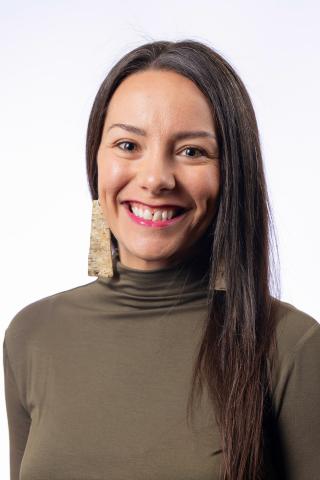
- Ongoing settler colonialism
- Indigenous knowledge systems
- De/Anti-colonialism
- Indigenous methodologies
- Public sociology
Ongoing U.S. Settler Colonialism and Native Peoples Teach-Out
This free, public, asynchronous online Teach-Out is hosted through Johns Hopkins University's Coursera platform. The course is approximately 10 hours of content, including lectures, artwork, readings, discussions, videos, activities, and reflections and offers a framework for recognizing and responding to ongoing settler colonialism as a social structure in the United States.
Perspectives from Indigenous Peoples/Native Nations illuminate examples of current settler colonialism as it shows up in education, law, food systems, race/ethnicity, media, land, gender, environment, and health/medicine, among others. Through the course, participants will better understand ongoing settler colonialism and (re)imagine anti-colonial processes in the U.S. as a way to co-create thriving futures.
Melissa is a citizen of the Manitoba Métis Federation and a first-generation unenrolled descendant of the Turtle Mountain Band of Chippewa. She also has settler lineages including German and English. Melissa grew up in Montana and revels in spending time with her family, practicing archery, traveling, reading, hunting, and hiking with her dog Koy, all of which shape the cultural, relational, and personal experiences that continuously inform her thinking, writing, research, teaching, and creativity.
After teaching high school and bartending in Montana for ten years, Melissa transitioned to the PhD program in Sociology at the University of Missouri.
Melissa’s research interests cohere around examining the structure of everyday, ongoing settler colonialism in the U.S. while also exploring Indigenous knowledge systems that persist in Native Nations and Indigenous communities through state and tribal policies.
Melissa is an alumna of the Health Policy Research Scholar program for the Robert Wood Johnson Foundation.
Horner-Petrone, Melissa. Under Review. “Attempted Elimination of Native Peoples as Structuring the Structure of Ongoing U.S. Settler Colonialism.”
Horner-Petrone, Melissa. Under Review. “Sociology of Ongoing U.S. Settler Colonialism and Indigenous Peoples/Native Nations.”
Horner, Melissa. 2023. “A Healing Methodology: An Indigenous Research Process.” In Nadia Kim and Pawan Dhingra (Eds.) Disciplinary Futures: Sociology in Conversation with American, Ethnic, and Indigenous Studies. New York: NYU Press.
Select Academic Presentations
Horner, Melissa. 2025, August. Ongoing U.S. Settler Colonialism and Indigenous Knowledge in Montana Lawmaking. Paper session: Indigenous Identity, Epistemology, and Creative Resistance to Colonialism, American Sociological Association Annual Meeting, Chicago, IL.
Horner, Melissa. 2025, June. Indigenous Law vs Colonial Law: Approaches to Land, Place, and Property. Virtual lecturer for Johns Hopkins Center for Indigenous Health Summer Institute.
Horner, Melissa, Iko’tsimiskimaki “Ekoo” Beck, and Mark Palmer. 2022, Nov. Stolen Children, Stolen Lands: Exploring the Forgotten History of American Indian Boarding Schools. Panel presentation for the Middleton Center for Race, Citizenship, and Justice. University of Missouri, Columbia, MO.
Horner, Melissa. 2022, July. Confluence: Indigenous Futures and Mutual Aid. Roundtable facilitation for Health Policy Research Scholars Summer Institute. Johns Hopkins Bloomberg School of Public Health, Baltimore, MD.
Horner, Melissa. 2022, April. Stolen Acknowledgements of Stolen Lands: An Exploration of Indigenous Land Acknowledgements in Higher Education. PechaKucha presentation at Midwest Sociological Society (MSS) Annual Meeting, Chicago, IL.
Horner, Melissa, D. Todd Lawrence, and Daisy Barron. 2022, Feb. Race and Rurality. Virtual panel presentation for The Bridge, College of Education and Human Development. University of Missouri, Columbia, MO.
Select Public/Community Sociology
Rusch, Mike. 2025. “the doctrine with Melissa Horner, part 1.” January 28 in the underview, produced by Mike Rusch, podcast, 1 hour, 17 min. Link
Rusch, Mike. 2025. “the doctrine with Melissa Horner, part 2 & 3.” February 4 in the underview, produced by Mike Rusch, podcast, 56 min & 57 min. Link
Horner, Melissa. 2022, March. Storyteller. Connection: Cousins in North Dakota. Community storytelling performance for True/False Documentary Film Festival’s “Campfire Stories,” Columbia, MO.
Horner, Melissa, Anton Treuer, Melissa Lewis. 2022, Feb. Panelist. Post-film Conversation: Dodging Bullets—Stories from Survivors of Historical Trauma. Community panel in collaboration with Ragtag Film Society, Columbia, MO.
Horner, Melissa. 2021, Jan. Panelist. Exploring the Land Acknowledgement: Intentionality in Acknowledging Indigenous Lands and Places. Virtual public panel as part of the “Native Futures, Native Voices” series hosted by the Alliance for Native Programs and Initiatives, St. Louis, MO. Link.
Horner, Melissa, Daniela Velazquez, and Marvin Greer. Panelist. 2020, Oct. From Columbus to Coachella: Appropriation vs. Appreciation. Virtual public panel in collaboration with Missouri Humanities, St. Louis, MO. Link.
Horner, Melissa, Yatika Starr Fields, and Ryder Jiron. 2020, July. Panelist. Indigenous ScholARTistry and the Agitation of White Supremacy: An Indigenous Mural Project at a Primarily White Institution (PWI) of Higher Education. Virtual public panel for Tulsa Artist Fellowship, Tulsa, OK. Link.
Select Media Appearances
"Disrupting Narratives: A Scholar’s Teach-Out on U.S. Settler Colonialism and Indigenous Knowledge" by Health Policy Research Scholars for RWJF.
“Building an Indigenous Presence in Columbia” by Sarah Parisien for the Columbia Missourian.